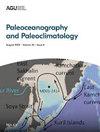Dynamics of the Marine Dissolved Organic Carbon Reservoir in Glacial Climate Simulations: The Importance of Biological Production
IF 3.2
2区 地球科学
Q2 GEOSCIENCES, MULTIDISCIPLINARY
引用次数: 0
Abstract
The marine dissolved organic carbon (DOC) reservoir rivals the atmospheric carbon inventory in size. Recent work has suggested that the size of the DOC reservoir may respond to variations in sea temperature and global overturning circulation strength. Moreover, mobilization of marine DOC has been implicated in paleoclimate events including Cryogenian glaciation and Eocene hyperthermals. Despite these suggestions, the dynamics of the marine DOC reservoir are poorly understood, and previous carbon cycle modeling has generally assumed this reservoir to be static. In this study, we utilize an Earth system model of intermediate complexity to assess the response of the marine DOC reservoir to various glacial boundary conditions. Our results indicate that the marine DOC reservoir is responsive to glacial perturbations and may shrink or expand on the order of 10–100 Pg C. In contrast to recent studies that emphasize the importance of DOC degradation in driving the mobility of DOC reservoir, our study indicates the importance of DOC production. In the experiment under full glacial boundary conditions, for example, a 19% drop in net primary production leads to an 81 Pg C reduction in the DOC pool, without which the atmospheric CO2 concentration would have been lower by approximately 38 ppm by dissolved inorganic carbon changes alone. Thus, DOC reservoir variability is necessary to fully account for the simulated changes in atmospheric CO2 concentration. Our findings based on glacial experiments are corroborated in a different set of simulations using freshwater flux to induce weakening of the Atlantic meridional overturning circulation.冰川气候模拟中海洋溶解有机碳储层的动态:生物生产的重要性
海洋溶解有机碳(DOC)储量在规模上可与大气碳储量相媲美。最近的研究表明,DOC库的大小可能响应海温和全球翻转环流强度的变化。此外,海洋DOC的动员与低温冰期和始新世热活动等古气候事件有关。尽管有这些建议,但人们对海洋DOC库的动力学知之甚少,以前的碳循环建模通常假设该库是静态的。在这项研究中,我们利用一个中等复杂程度的地球系统模型来评估海洋DOC库对各种冰川边界条件的响应。我们的研究结果表明,海洋DOC储层对冰川扰动有响应,可能在10-100 Pg c的量级上收缩或扩大。与最近强调DOC降解在驱动DOC储层流动性中的重要性的研究相反,我们的研究表明DOC产生的重要性。例如,在完全冰川边界条件下的实验中,净初级产量下降19%导致DOC库中减少81 Pg C,如果没有这些,仅通过溶解无机碳的变化,大气CO2浓度就会降低约38 ppm。因此,DOC库变率对于充分考虑模拟的大气CO2浓度变化是必要的。我们基于冰川实验的发现在一组不同的模拟中得到了证实,这些模拟使用淡水通量诱导大西洋经向翻转环流的减弱。
本文章由计算机程序翻译,如有差异,请以英文原文为准。
求助全文
约1分钟内获得全文
求助全文
来源期刊

Paleoceanography and Paleoclimatology
Earth and Planetary Sciences-Atmospheric Science
CiteScore
6.20
自引率
11.40%
发文量
107
期刊介绍:
Paleoceanography and Paleoclimatology (PALO) publishes papers dealing with records of past environments, biota and climate. Understanding of the Earth system as it was in the past requires the employment of a wide range of approaches including marine and lacustrine sedimentology and speleothems; ice sheet formation and flow; stable isotope, trace element, and organic geochemistry; paleontology and molecular paleontology; evolutionary processes; mineralization in organisms; understanding tree-ring formation; seismic stratigraphy; physical, chemical, and biological oceanography; geochemical, climate and earth system modeling, and many others. The scope of this journal is regional to global, rather than local, and includes studies of any geologic age (Precambrian to Quaternary, including modern analogs). Within this framework, papers on the following topics are to be included: chronology, stratigraphy (where relevant to correlation of paleoceanographic events), paleoreconstructions, paleoceanographic modeling, paleocirculation (deep, intermediate, and shallow), paleoclimatology (e.g., paleowinds and cryosphere history), global sediment and geochemical cycles, anoxia, sea level changes and effects, relations between biotic evolution and paleoceanography, biotic crises, paleobiology (e.g., ecology of “microfossils” used in paleoceanography), techniques and approaches in paleoceanographic inferences, and modern paleoceanographic analogs, and quantitative and integrative analysis of coupled ocean-atmosphere-biosphere processes. Paleoceanographic and Paleoclimate studies enable us to use the past in order to gain information on possible future climatic and biotic developments: the past is the key to the future, just as much and maybe more than the present is the key to the past.
 求助内容:
求助内容: 应助结果提醒方式:
应助结果提醒方式:


